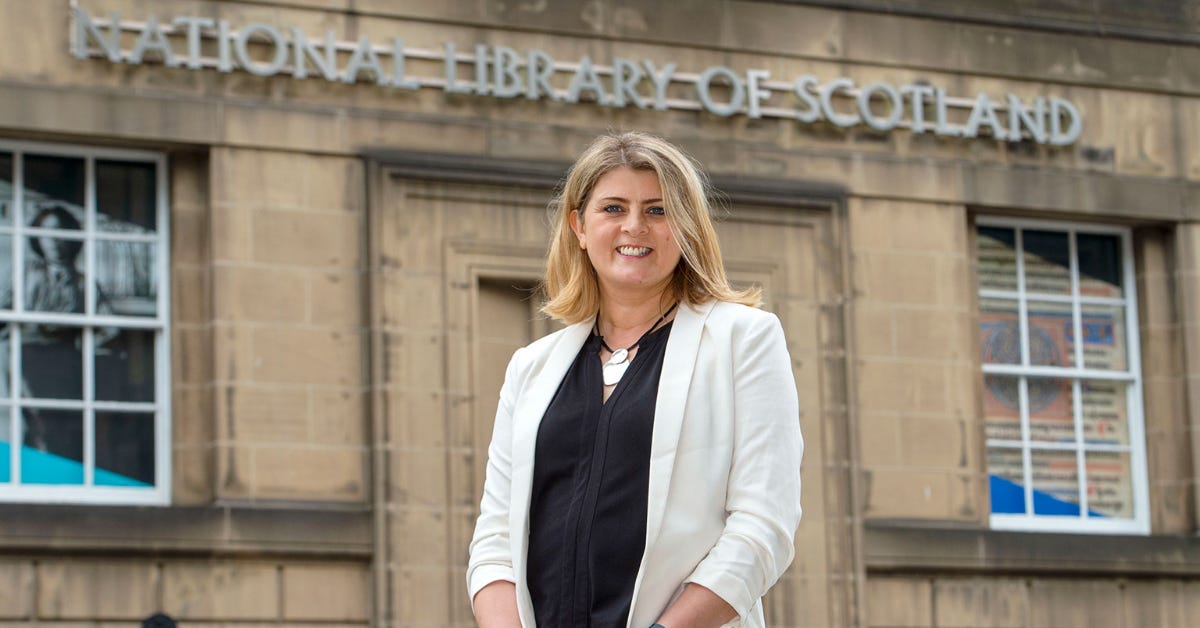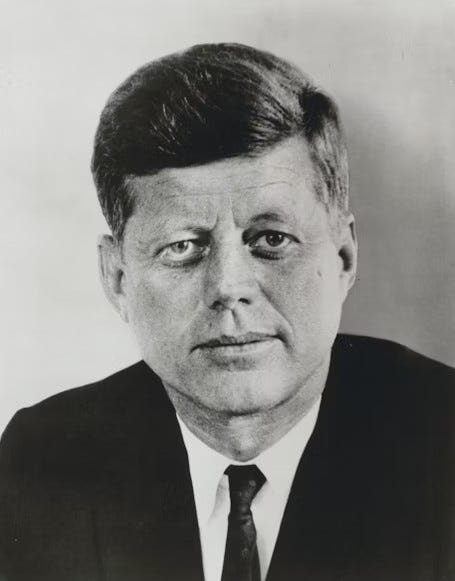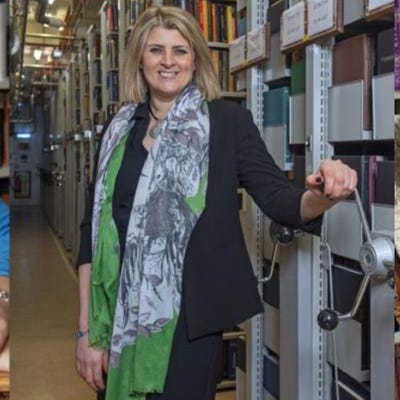'Everyone should be able to sit with the genius of humankind'
How the centenary of the National Library of Scotland is growing appreciation of the crucial role our libraries play
“If this nation is to be wise as well as strong, if we are to achieve our destiny, then we need more new ideas for more wise men reading more good books in more public libraries. These libraries should be open to all except the censor. We must know all the facts and hear all the alternatives and listen to all the criticisms…”
The words of a young US Senator at a literary lunch in Cleveland in 1959. John F Kennedy would go on to become President, of course, and one whose approval ratings averaged more than 70% during his too-brief and brutally extinguished time in office.
At that same lunch he told his audience: “Let us not be afraid of debate or dissent – let us not avoid criticism or non-conformity – let us encourage it. For if we should ever abandon these basic American traditions … what would it profit us to win the whole world when we would have lost our own soul?”
His words surely ring down the years…
The National Library of Scotland (NLS) lies at the heart of its capital, on George IV Bridge, and at the heart of our nation’s network of libraries, and this year is celebrating its 100th anniversary. The most recent manifestation of this year is the free “Dear Library” exhibition, in which a marvellous collection of books and documents – often recommended by famous and distinguished Scots – will reignite your love affair with libraries. It runs until summer next year.
Libraries help people navigate this world…
National Librarian Amina Shah, the chief executive at the NLS, was determined that the centenary of the founding of the NLS would be a time to celebrate not only that act, but also the vital role played by libraries in our lives.
She told the Inquirer: “I think we are coming to point where people are recognising the value of community, of things that belong to everyone, and the value that has to democracy - the idea that we all have access to information. The value of slowness, and the value sometimes of getting space and headspace…
“Libraries are a trusted way to help people navigate this world, to help them understand what is true, how they can be a part of it rather than life just happening to them. People want to take that control of what they read, what they write, what they can say.”
This is a time, remember, when the current US President sacked Carla Hayden, the Librarian of Congress and the keeper of that enormous repository of knowledge and information, in a two-line email in April. The White House later confirmed this was because the first professional librarian, woman and non-white person to hold the position “did not fit the needs of the American people.”
Libraries give us power…
Shah added: “We are coming back to a place where there is a moment in time for a pause. People are realising that we should actually nurture what generations before us have created and left for us. Libraries empower individuals to change their own lives.” Libraries have faced challenges, she said, at times almost existential, and yet “we find that people return to this concept, this idea, that everyone should be able to sit with the genius of humankind.”
Edinburgh is a particularly important bastion in a network of public, private and specialist libraries that provide a vital protection for democracy, she believes. “Massive I would say. This was the first UNESCO City of Literature, it is a truly literary city, with a great history of learning and advancement.”
She wants to see us make more of this, both as a city and a nation. “In Dublin, Bloomsday is a citywide celebration of the work of Joyce held every June [the name comes from the main protagonist in James Joyce’s most famous novel Ulysses] and they really make use of their authors and their literary tradition. We are working more closely with other libraries and our literature sector about using our collective might to sell Edinburgh’s literary history and eminence to the wider world.”
Best-selling author and Capital local Sir Ian Rankin helped launch the “Dear Library” exhibition, and quoted the Manic Steet Preachers’ 1996 hit song “A Design for Life” which opens with the line “Libraries gave us power…” – inspired by an inscription above their local library which read “Knowledge is Power.”
That democratisation of information and knowledge was behind the creation of the NLS, born from the Faculty of Advocates and their library, which founded in the 1680s and was one of the best in world. It was given to the nation in 1920, and the NLS was established by Act of Parliament in 1925. The building, which was delayed by war, was built in the 1950s.
A nation’s memory
The collection spans centuries, contains more than 30 million items from books and manuscripts to films, images, music and maps. The National Librarian described it aptly as “the nation’s memory” and she is keen to share that memory with as many people as she possibly can.
Some of the most rare and valued treasures – for example the letter written by Mary Queen of Scots to her French brother-in-law the night before she was executed – are going out to various locations throughout Scotland, in the case of the Queen’s letter to Perth where it will form the centrepiece not only of an exhibition but of a programme connecting schoolchildren with their history.
And it is not just the collection; she wants to kick the doors of the National Library open even further. “The building was built at a time when it was about keeping books in and people out. I was a student in Edinburgh and I remember going in and the guy on the desk at the front told me to get out straight away. I was a student of English literature but even so I was directed firmly to the public library across the road.
“Those who have had this role before me, and now me, have spent decades since trying to open it up bit by bit but it is hard, the space is not big enough or welcoming enough. It is well-used, and we already have an amazing programme of events, we have built fantastic communities and we are a sea of niches who come together in everything from history groups to groups working with dementia, but we have not got great space for them. We try to accommodate them.”
As part of the centenary all of the National Librarians from Europe came to Edinburgh. “We had an event at the Castle, and it was fantastic, but we could not fit them into the library for the conference we held so we had to have it at Edinburgh Futures. That was good, but we need a space like that of our own. We have loads of potential. Our space is a bit makeshift.”
There have been reports that the building would create a wedding venue, a headline that brings a smile to Shah’s face. “Yes, the building is not going to be a wedding venue, not per se. I mentioned weddings because I knew New York Library had successfully hosted weddings. We want to create more welcoming space and if that can be used for hires for events – be they weddings or academic gatherings – then that is a benefit. The money we make can be reinvested in providing more opportunities to more people to connect with the library.”
Such spaces should sit in complementary harmony with the Library’s function as a reading room, she said. “We have a lovely reading room, but that could be better as well. Creating great spaces is not mutually exclusive but should be mutually beneficial. And as well as these spaces, we need to have great systems to store and retrieve our millions of items – with the collection ever-growing by around 7000 items per week.”
Our love affair with libraries
Funding, of course, will be key. “We are fortunate in that the Scottish Government, which provides the largest part of our funding, is supportive of that narrative that says libraries are a vital part of a democratic community. But there is no doubt that the funding landscape is tough, and we need to diversify and find more ways to raise money. We generate revenue from our factory in Sighthill which makes preservation boxes, which we developed in partnership with Heriot-Watt University and which we make for our own use but also sell to other heritage organisations.
“We make some income from image sales, for example through our incredible collection of maps, our shop, our café, so creating spaces for events is a natural next step. And of course, we do get funding from generous donors, for which we are really grateful.”
Scotland, and it’s Capital, have a love affair with libraries. More than 40 million people visit their public libraries every year – the most popular public service – and that number is more than those who attend professional football matches and cinemas combined.
So, protecting the future of our libraries is something Shah and her colleagues feel keenly. “I do feel that pressure, to protect what previous generations have created for and to pass it on to the next generation for their benefit. We are a pretty humble profession, librarians, and we quietly get on with things. But the centenary has given us an opportunity to talk more urgently about how important libraries are, and that is what we are doing.”







The idea of using the National library as a space where book lovers could choose to get married is an inspiring one.